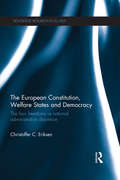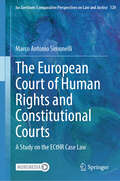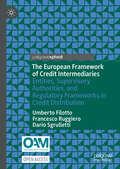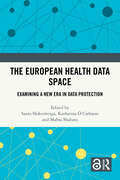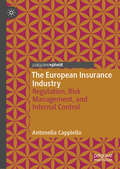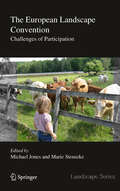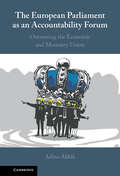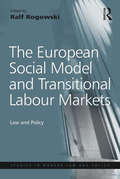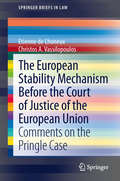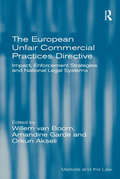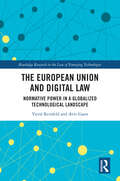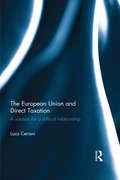- Table View
- List View
The European Constitution, Welfare States and Democracy: The Four Freedoms vs National Administrative Discretion (Routledge Research in EU Law)
by Christoffer C. EriksenThis book explores how the right to the free movement of goods, persons, services and capital in the European Union legal order affects welfare states. These "four freedoms", as they are known, are vital instruments for the protection of a European market unencumbered by internal frontiers. The European Constitution, Welfare States and Democracy explore the relationships and conflicts that have emerged between the European constitution and the legal regulation of mixed economies and markets within welfare-states. In particular, it examines the threat posed to the discretionary powers enjoyed by national governments and administrative authorities. Christoffer C. Eriksen has undertaken a comprehensive analysis of a series of judgments in which the European Court of Justice has clearly indicated the ways in which the four freedoms may be incompatible with the current practice of entrusting national administrative authorities with discretionary powers and thus highlights how the four freedoms are provoking democratic dilemmas, previously neglected in the academic literature. The book is written in a style which communicates beyond an audience of specialized legal scholars and although it includes analysis of black letter law, its methodology also draws from the disciplines of philosophy, political science, and sociology.
The European Convention of Human Rights Regime: Reform of Immigration and Minority Policies from Afar (Routledge Research in Human Rights Law)
by Dia AnagnostouPrompted by an unprecedented rise of litigation since the 1990s, this book examines how the European Convention of Human Rights (ECHR) system and the Strasbourg Court interact with states and non-governmental actors to influence domestic change. Focusing on European Court of Human Rights litigation and state implementation of judgments related to minority discrimination and asylum/migration, it argues that a fundamental transformation of the Convention system has been under way. Repeat and strategic litigation, shifting methods of supervision and state implementation to remedy systemic violations, and above all the growing engagement of civil society and non-governmental actors, have prompted a distinctive trend of human rights experimentalism. The emergence of experimentalism has profound implications for the legitimacy, effectiveness and further reform of the ECHR system. This study provides an original constitutive account of regional human rights regimes and how they are activated by societal actors to claim rights, advance case law, and pressure for domestic legal and policy change. It will be of interest to international law and international relations scholars, political scientists, specialists on the ECHR, the Strasbourg Court, as well as to scholars interested in the human rights of immigrants and minorities.
The European Convention on Human Rights and the COVID-19 Pandemic (Routledge Research in Human Rights Law)
by Ronagh J.A. McQuiggThis book provides detailed analysis of the applicability of the provisions of the European Convention on Human Rights to issues raised by the COVID-19 pandemic. It encompasses in-depth discussion of the emerging jurisprudence of the European Court of Human Rights relating to issues arising from the pandemic. To date, a substantial number of complaints concerning such issues have been made to the Court. Human rights claims in the context of the pandemic fall into two broad categories: those based on arguments that states did not put in place sufficient measures to protect individuals from the virus and those entailing arguments that the measures put in place themselves involved breaches of rights. The essential question with which the European Court of Human Rights must grapple is how to adjudicate on the correct balance which should have been struck. The book argues that the Court should be cautious of finding breaches of the European Convention on Human Rights in cases involving public restrictions which were applied for the purpose of protecting life and health in response to a global pandemic. If the concept of a human rights violation is defined too broadly, it dilutes the seriousness of such a breach. In particular, it is argued that to preserve the legitimacy of human rights law, the Court must be cautious of applying an overly narrow margin of appreciation in such cases. The work will be of interest to academics, researchers and policymakers working in the area of human rights.
The European Court of Human Rights and Constitutional Courts: A Study on the ECtHR Case Law (Ius Gentium: Comparative Perspectives on Law and Justice #120)
by Marco Antonio SimonelliThis book investigates the relationship between the European Court of Human Rights (ECtHR) and national constitutional courts by providing a more general assessment as seen from the former’s perspective. Adopting an empirical approach, the book reviews all the case law of the ECtHR in which constitutional courts are cited. This represents more than 3,000 rulings spanning more than fifty years, from the establishment of the Strasbourg Court in 1959 – when only three constitutional courts were active – to 1 January 2023, when there were more than thirty active constitutional courts in the Council of Europe’s Member States. This wide-ranging empirical study pursue several different goals. First, the book provides a quantitative assessment of the relevance of constitutional courts in ECtHR case law and presents weighted data on the frequency and chronological evolution of the citations, as well as individual statistics for each national constitutional court. Second, it assesses the extent of the rationalisation of constitutional justice systems conducted by the Strasbourg Court and defines the standards and elements of the right to a fair constitutional trial under Article 6 ECHR. Finally, combining this extensive dataset with qualitative analysis, the book evaluates how the Strasbourg Court interacts with each constitutional jurisdiction and provides a qualitative assessment of this relationship from the standpoint of Strasbourg case law.
The European Court of Human Rights as a Pathway to Impunity for International Crimes
by Sonja C. GroverThis book presents contentious case rulings by the European Court of Human Rights providing extensive case notes and questions. The book elucidates just how the Court came in those cases to contribute to lack of State accountability and to impunity for individual perpetrators of international crimes. Issues addressed include the Court's: derogation of the jus cogens nature of certain fundamental human rights, grant of State immunity from any liability for systemic torture, unjustified failure to classify certain European Convention on Human Rights violations as international crimes; and improper declining of jurisdiction where States participated in a U.N. peace-building mission that itself involved serious violations of the U.N. Charter human rights principles. The book argues that the moral integrity of the Court's rulings (rulings that promote and protect international human rights) is an essential aspect of promoting the internationalization of the rule of law.
The European Court of Human Rights in the Post-Cold War Era: Universality in Transition (Routledge Research in Human Rights Law)
by James A. SweeneyThe European Court of Human Rights in the Post-Cold War Era: Universality in Transition examines transitional justice from the perspective of its impact on the universality of human rights, taking the jurisprudence of the European Court of Human Rights as its detailed case study. The problem is twofold: there are questions about differences in human rights standards between transitional and non-transitional situations, and about differences between transitions. The European Court has been a vital part of European democratic consolidation and integration for over half a century, setting meaningful standards and offering legal remedies to the individually repressed, the politically vulnerable, and the socially excluded. After their emancipation from Soviet influence in the 1990s, and with membership of the European Union in mind for many, the new democracies of Central and Eastern Europe flocked to the Convention system. The voluminous jurisprudence of the European Court of Human Rights can now give us some clear information about how an international human rights law regime can interact with transitional justice. The jurisprudence is divided between those cases concerning the human rights implications of explicitly transitional policies (such as lustration), and those that involve impacts upon specific democratic rights during the transition. The book presents a close examination of claims by states that transitional policies and priorities require a level of deference from the Strasbourg institutions. The book proposes that states’ claims for leeway from international human rights supervisory mechanisms during times of transition can be characterised not as arguments for cultural relativism, but for ‘transitional relativism’.
The European Framework of Credit Intermediaries: Entities, Supervisory Authorities, and Regulatory Frameworks in Credit Distribution
by Umberto Filotto Francesco Ruggiero Dario SgrullettiThis open access book provides an overview of the credit distribution ecosystem in Europe, with a specific focus on the definitions, laws, and authorities related to the figures of credit intermediaries (credit agents and brokers). It explores the regulatory framework, market structures, and technological innovations in credit intermediation. The analysis draws on the authors&’ academic research in banking and finance, industry experience with institutional clients and financial product distribution, and the regulatory role of the OAM. The book defines and classifies credit intermediaries in different European jurisdictions, including the UK, and compares regulatory and legislative frameworks governing credit distribution across these markets. It also analyses the role of national supervisory authorities in this sector. Designed for finance professionals, regulators, and scholars, the book offers an in-depth examination of credit agents and brokers in the European market.
The European Harmonization of National Accounting Rules: The Application of Directive 2013/34/EU in Europe (SIDREA Series in Accounting and Business Administration)
by Alberto Incollingo Andrea LionzoWith Directive 2013/34/EU - which replaced the 4th and 7th accounting Directives - a new step towards European accounting harmonization has been taken: accounting rules on private firms have been further standardized and, at the same time, brought closer to IAS/IFRS. This book develops a comparative analysis of the most relevant issues in the process of preparing the financial statements after the recent transposition of the aforementioned Directive into the local accounting rules and standards. This book is of interest for several reasons. First, private firms, which are not necessarily small-medium sized companies, are the most prevalent and the engine of growth in all European countries. At the same time, the international academic literature is mainly devoted to listed companies, due to the limited availability of data for private companies and the idea that accounting information is less relevant for this kind of companies. In addition, the analysis contained in the book is the result of the work of more than 30 European researchers, who contributed to both a vertical analysis of eight countries (Germany, Spain, Italy, France, the Netherlands, the United Kingdom, Sweden, and Denmark) and a horizontal analysis of the most relevant cross-cutting issues (fundamental principles, financial statement formats, impairment losses, capital reserves and profit distribution, income taxes, and non-financial reporting). More specifically, the book aims to examine, from a comparative perspective, the methods of application of the Directive in Europe, in parallel with the evolutionary processes of national GAAPs, in order to verify the impact of both legal regulations and professional rules on the quality and comparability of accounting information, as well as the degree of convergence towards the IAS/IFRS model.
The European Health Data Space: Examining A New Era in Data Protection
by Santa Slokenberga Katharina Ó Cathaoir Mahsa ShabaniThis timely volume provides a comprehensive examination of how the proposed new European Health Data Space (EHDS) legislation will impact upon health and genetic data, individual privacy and providers of health services.With the current legal framework recognised as insufficient in protecting data-related rights, the book spotlights the opportunities and challenges posed by the EHDS in balancing the interests of individuals with policymakers and researchers. It considers the impact on individual EU member states while highlighting issues such as changes to patients’ rights, wearable technology, developments in e-health and the secondary use of medical data. Critically, it also examines how the EHDS will operate within existing legal frameworks, including the General Data Protection Regulation, the Data Governance Act and the Data Act.Including contributions from some of the leading scholars in this area, this groundbreaking book will be key reading for students and researchers across law and public health.Chapters 2, 10 and 11 have been made available under a Creative Commons Attribution-NonCommercial-NoDerivatives (CC-BY-NC-ND) 4.0 license. Chapter 5 has been made available under a Creative Commons Attribution (CC-BY) 4.0 license.
The European Impact Assessment and the Environment
by Martin Führ Sebastian Lechner Kilian BizerThe European Commission requires an impact assessment report for any regulation proposed. This book analyzes the quality of impact assessments and discusses deficits and possible improvements. Based on 30 case studies of impact assessments, an institutional analysis of the relevant actors is conducted, which shows that there are many shortcomings, among them an incentive problem concerning desk officers in the European Commission. The book includes various articles which address controversial problems and possible solutions. It offers a comprehensive overview of the practice of impact assessment in the EC, as well as an institutional analysis of the processes involved and of the checks and balances between politicians and their administration.
The European Insurance Industry: Regulation, Risk Management, and Internal Control
by Antonella CappielloThis book analyses the methodologies and functions of a systemic approach to risk governance and internal control capable of tackling the complexity of the insurance business. It focuses on the main trends currently impacting the insurance industry, characterized by new operators, new products and services, new tools, new styles of competition, and new risks. It provides tips and empirical contributions addressing the role of sound internal control and risk management models within an ongoing revision of prudential regulation to better deal with the evolving scenario where insurance activities are becoming increasingly risky and complex. The book is of particular interest to scholars and students of insurance and financial services and practitioners in the insurance industry.
The European Landscape Convention
by Michael Jones Marie StensekeThis important and insightful book provides, for the first time, a broad presentation of ongoing research into public participation in landscape conservation, management and planning, following the 2000 European Landscape Convention which came into force in 2004. The book examines both the theory of participation and what lessons can be learnt from specific European examples. It explores in what manner and to what extent the provisions for participation in the European Landscape Convention have been followed up and implemented. It also presents and compares different experiences of participation in selected countries from northern, southern, eastern and western Europe, and provides a critical examination of public participation in practice. However, while the book's focus is necessarily on Europe, many of the conclusions drawn are of global relevance. The book provides a valuable reference for researchers and advanced students in landscape policies and management, as well as for professionals and others interested in land-use planning and environmental management.
The European Neighbourhood Policy - Values and Principles: Values And Principles
by Sara PoliThe European Neighbourhood Policy is a key part of the foreign policy of the European Union (EU), through which the EU works with its southern and eastern neighbours with a view to furthering its interests and achieving the closest possible degree of political association and economic integration. The policy is underpinned by a set of values and principles that the EU seeks to promote. The European Neighbourhood Policy – Values and Principles carries out a legal analysis of the values and principles that form the basis for the European Neighbourhood Policy – respect for human dignity, freedom, democracy, equality, the rule of law and respect for human rights (including the rights of minorities), plus the principles of conditionality, differentiation and coherence. This collection explores the instruments that the EU has deployed under the European Neighbourhood Policy to spread its values and to achieve its interests. It assesses to what extent the EU has been (and is) consistent in upholding its values in its relations with neighbouring countries, and examines how these values have been received by these countries. The book looks in particular at the nature of EU-Russia relations, seeking to identify areas of common interest as well as those of actual and potential disagreement.
The European Parliament as an Accountability Forum: Overseeing the Economic and Monetary Union
by Adina AkbikThis book provides the first in-depth empirical study of the European Parliament's powers of scrutiny of the executive in the European Union (EU) political system, focusing on the politically salient field of the Economic and Monetary Union. The expansion of executive decision-making during the euro crisis was accompanied by an empowerment of the European Parliament through legislative oversight. This book examines how the European Parliament exercises that oversight on a day-to-day basis and thus contributes to political accountability at the EU level. Building on an innovative analytical framework for the study of parliamentary questions and answers, Adina Akbik sheds light on the European Parliament's possibilities and limitations to hold EU executive bodies accountable more generally. Case studies cover the period 2012 to 2019 and include the European Central Bank in banking supervision, the European Commission, the Eurogroup, and the Economic and Financial Affairs Council. This title is Open Access.
The European Public Prosecutor's Office: The Challenges Ahead (Legal Studies in International, European and Comparative Criminal Law #1)
by Lorena Bachmaier WinterThis book explores the European Public Prosecutor’s Office (EPPO), the creation of which was approved in the Regulation adopted by the Justice and Home Affairs (JHA) Council on 12 October 2017. The EPPO will be an independent European prosecution office tasked with investigating and prosecuting those crimes defined in the recently adopted Regulation 2017/1371 on combating fraud against the Union’s financial interests by means of criminal law. As such, it will be a new actor on the EU landscape, governed by the principle of loyal cooperation with the national prosecuting authorities.This work clarifies some of the challenges that member states will have to face when dealing with a supranational prosecution authority. In addition, it provides guidelines on how to implement the present Regulation while respecting the fundamental rights of defendants in criminal proceedings.The book is of special interest in so far as the analysis and perspective of academics is completed with the contributions of legal experts who have either been involved in the negotiations to establish the European public prosecutor or will be closely linked, as public prosecutors, to the functioning of the future European public prosecutor’s office.
The European Social Model and Transitional Labour Markets: Law and Policy (Studies In Modern Law And Policy Ser.)
by Ralf RogowskiBringing together theoretical, empirical and comparative perspectives on the European Social Model (ESM) and transitional labour market policy, this volume contains theoretical accounts of the ESM and a discussion of policy implications for European social and employment policies that derive from research on transitional labour markets. It provides an economic as well as legal assessment of the European Employment Strategy and contains evaluations of new forms of governance both in European and member state policies, including discussions of the potential and limits of soft law instruments. Country studies of labour market reforms in Denmark, the Netherlands, Belgium and France assess their contribution to an emerging ESM, while comparative accounts of the ESM examine mobility and security patterns in Europe and beyond and evaluate recent 'flexicurity' policies from a global perspective.
The European Sovereign Debt Crisis: Breaking the Vicious Circle between Sovereigns and Banks (Routledge Research in Finance and Banking Law)
by Phoebus L. Athanassiou Angelos T. VouldisThe European Sovereign Debt Crisis: Breaking the Vicious Circle between Sovereigns and Banks explains why the euro area’s progress towards reining in the risks arising from the well-documented bi-directional financial contagion transmission mechanism that links sovereigns to commercial banks has been more prominent compared to the channel of contagion moving from banks to sovereigns. Providing an analysis of the legal and regulatory measures that Europe and the euro area have taken to mitigate the exposure of sovereigns to financial crises generated by commercial banks, this book draws attention to areas where improvements to the arsenal of tools hitherto introduced are either desirable or necessary. Chapters further explain – with recourse to economic and legal arguments – why the channel of contagion moving from sovereigns to commercial banks has proven harder to close, and explores ways in which progress could be made in the direction of closing it so as to avert the risk of future banking sector crises. This work provides essential reading for students, researchers and practitioners with an interest in sovereign debt crises and the euro-area banking system.
The European Stability Mechanism Before the Court of Justice of the European Union
by Etienne Lhoneux Christos A. VassilopoulosThis book provides an analysis of the judgment of the Court of Justice of the European Union in the Pringle case. It focuses on the three main aspects of the ruling. First, it examines the part of the judgment concerning the validity of the European Council Decision 2011/199 - adopted under the simplified revision procedure (Article 48(6) TEU) - which provides for the possibility to establish a financial stability mechanism. Second, it evaluates the new rules developed by the Court in order to interpret agreements concluded exclusively by the member states, such as the ESM Treaty. Third, it assesses the Court's interpretation of the main provisions of the so-called economic pillar of the Economic and Monetary Union and the fundamental rules provided for by the Treaties (nature of competence, financial assistance, institutional balance, judicial review charter of fundamental rights etc. ) with regard to the ESM treaty provisions.
The European Unfair Commercial Practices Directive: Impact, Enforcement Strategies and National Legal Systems (Markets and the Law)
by Amandine Garde Willem van BoomOne of the most important EU consumer protection directives of the past decade, the 2005 Unfair Commercial Practices Directive, or UCPD, is brought under examination in this stimulating volume. Bringing together leading experts in the comparative law and consumer law domain, the book discusses the impact of the Directive and whether the many possible issues identified at its inception have been borne out in practice. Divided into four parts of 'Implementation, Approximation and Harmonization', 'Vulnerability', 'The UCP Directive and Other Regimes', and finally 'Enforcement', the volume examines the various policy developments, the growing body of case law, the decisions of relevant national enforcement authorities, as well as the legislative debates which have surrounded the implementation of the UCPD in Member States. This book provides a valuable assessment of the impact of a major EU directive almost ten years after its adoption, and as such will be of interest to academics, legal practitioners and the judiciary working in the areas of European and Consumer law.
The European Union after Lisbon
by Stelio Mangiameli Hermann-Josef BlankeThe book contains 24 contributions from European law scholars and practitioners analysing the constitutional basis of the European Union and the normative orientation of the Common Foreign and Security Policy (CFSP) as well as the central economic and monetary provisions (TFEU) after the Reform Treaty of Lisbon. Presenting the findings of a European research team, which is composed of authors from eight Member States, the publication underlines the aspiration of the editors to thoroughly analyse the constitutional law of the European Union currently in force.
The European Union after the Treaty of Lisbon
by Ioannis Lianos Diamond Ashiagbor Nicola CountourisThis volume of essays casts light on the shape and future direction of the EU in the wake of the Lisbon Treaty and highlights the incomplete nature of the reforms. Contributors analyse some of the most innovative and most controversial aspects of the Treaty, such as the role and nature of the EU Charter of Fundamental Rights and the relationship between the EU and the European Court of Human Rights. In addition, they reflect on the ongoing economic and financial crisis in the Euro area, which has forced the EU Member States to re-open negotiations and update a number of aspects of the Lisbon 'settlement'. Together, the essays provide a variety of insights into some of the most crucial innovations introduced by the Lisbon Treaty and in the context of the adoption of the new European Financial Stability Mechanism.
The European Union and Customary International Law
by Fernando Lusa Bordin Th. Müller Andreas Francisco Pascual-VivesThe book gathers a group of scholars interested in both public international law and EU law to cover different facets of the relationship between the European Union and customary international law. Considering the distinct perspectives taken by international law and EU law, while also looking into the space in between the two, individual chapters tackle complex questions such as whether and on what bases the European Union is bound by customary international law as a matter of international law and EU law; how the European Union contributes to the development of international custom; and how different stakeholders – the Court of Justice of the European Union, the EU's political organs and EU citizens – rely upon customary rules. The book thus offers a systematic account of the relevance of customary international law for the external relations and internal functioning of what is no doubt the most remarkable regional international organization of our time.
The European Union and Digital Law: Normative Power in a Globalized Technological Landscape (Routledge Research in the Law of Emerging Technologies)
by Yuval Reinfeld Aviv GaonThis book introduces the concept of Technical Normative Power (TNP) to explain how the European Union (EU) transforms internal legal frameworks into external influence.Over the past two decades, the EU has emerged as a global regulatory force in the digital age. As technologies such as big data, cloud computing, and generative artificial intelligence reshape modern life, the EU has responded with a legal model grounded in rights-based governance, institutional coherence, and judicial authority. This book focuses on two emblematic instruments: the General Data Protection Regulation (GDPR) and the Artificial Intelligence Act (AIA). It examines how both EU legislation and the case law of the Court of Justice of the European Union (CJEU) work together to set global standards in data protection, AI governance, and digital rights. The EU’s ability to combine legal consistency, regulatory ambition, and market access has made it a key actor in shaping the global digital order. Structured in three parts, the book traces the evolution of EU digital regulation, analyzes the mechanisms of its legal and institutional architecture, and evaluates its impact on global governance.This book will be of interest to scholars, students, and professionals in EU law, digital regulation, artificial intelligence, and the law of emerging technologies.
The European Union and Direct Taxation: A Solution for a Difficult Relationship
by Luca CerioniWithin the European Union, direct taxation is an area which often provokes controversy due to tensions between the tax sovereignty of the individual Member States and the desire for an integrated internal market. This book offers a critical review of the legislative and case-law developments in this area at the EU level, and reviews the European Commission’s proposed solutions in light of their concerns regarding the proper functioning of the EU’s internal market. Luca Cerioni set out a series of benchmarks determined from the objectives expressed by the European Commission, including: the elimination of double taxation and double non-taxation; the simplification of cross-border tax compliance; the reduction of abusive forum-shopping practices and general aggressive tax planning strategies; legal certainty for all businesses and individuals carrying on activities and receiving income in more than one EU Member State. Cerioni uses these benchmarks to ask which Directives and/or rulings have left legal uncertainty, and which have ended up creating or increasing the scope for aggressive tax planning. The book puts forward a comprehensive solution for a new optimal regime relating to tax residence, which would contribute to the EU project to the mutual benefit of Member States and taxpayers. As a thorough and critical discussion of EU tax rules in force, and of the European Court’s case law in direct taxation, this book will be of great use to academic researchers and students of EU law, tax practitioners, and policy-makers at the EU and national level.
The European Union and Global Environmental Protection: Transforming Influence into Action (Routledge Studies in Environmental Policy)
by Mar Campins EritjaThis book examines how the EU can be a more proactive actor in the promotion of the principles of sustainability and fairness from a legal environmental perspective. The book is one of the results of the research activity of the Jean Monnet Chair in EU Environmental Law (2017-2020) funded by the European Commission under the Erasmus+ programme. The European Union and Global Environmental Protection: Transforming Influence into Action begins with an introduction of the key EU competences, instruments and mechanisms, as well as the current international challenges at the EU level. It then explores case study examples from four regulated fields: climate change, biodiversity, multilateral trade, unregulated fishing, and access to justice; and four unregulated areas: mainstreaming of the Sustainable Development Goals in EU policies, and environmental justice, highlighting the extent to which the EU might align with international environmental regimes or extend its normative power. This volume will be of great relevance to students, scholars, and EU policy makers with an interest in international environmental law and policy.
